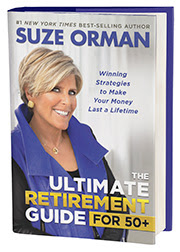
The rapid meltdown in global investments as the economic severity of the coronavirus takes
hold is indeed unsettling. For those of you nearing retirement, or already retired, watching your portfolio values drop is especially nerve-rattling. And for those of you near retirement but working, I know many of you are now worried if you may lose your job as many segments of the economy are shutdown.
|
Seek out love. We’ll get to the money advice in a moment, but those of you who have been with me for a long time know that I have always said People First. Then Money. Then Things. Social distancing does not prevent us from communicating with friends and family. FaceTime, texting, or dare I suggest an actual phone call are all available to us. Journal for your own loving self-care. If you are stressed, talking (and writing) will help. And remember you have the ability to help others by listening and sharing. It also pulls us out of our own heads and gives us a positive sense of purpose and feedback. Community matters so very much right now.
Stand tall. Those of you who have already read my new book, The Ultimate Retirement Guide for 50+ know that I consider your spirit and attitude your most essential money management tools. No financial strategy is more important than your mindset. Especially now. In my book I talk about being a warrior. Well, now is the time. Not sure you have it in you? Oh my friend, you absolutely do! Let go of fear, shame and blame. They only hold you back. Focus only on the future. Ask yourself each day, what can I do to feel more confident about my financial future. There are tasks small (spend less) and large (save more).
Lean on Cash. In my new book I explained that in addition to one’s emergency savings, anyone in retirement should have enough cash to cover all essential living expenses for at least two years. This is the money you need above what you get from guaranteed income sources such as Social Security or a pension. What is going on in the markets right now is exactly why I want you to have this big bucket of cash. Knowing you can cover your essential bills from “safe” money for at least a few years is how you stay calm right now.
For those of you nearing retirement who don’t yet have this big cash cushion, be strategic how you build up this cash cushion. Selling stocks is not necessarily the way to go after the big drop in values. I’d rather you first consider other options. Getting a tax refund? Okay, that goes into your cash bucket. Next, take a clear-eyed look at your spending. Does your household really need two cars and two car payments? Longer-term, as I write about in The Ultimate Retirement Guide for 50+, I am a big believer in being open to new living arrangements. Sharing a home with kids, siblings, cousins, friends can help financially, and as we age, be an important way to stay socially and emotionally connected.
If in the coming months the health crisis abates, the economy will begin to recover. While right now it may not be practical to downsize, use this time to start thinking about the power of a move to bolster your retirement security. In three months or six months or a year, if the economy is on steadier ground, it’s likely buyers will be able to get mortgages at historically low rates. I hope you will be smart and see how selling sooner than later –even if the price you might have gotten three months ago – can be a huge boost to your retirement strategy.
Keep your eye on the long-term. You would not be human if you weren’t somewhat nervous right now. But nervous is not a reason to act rashly. Especially with your retirement investments. If a month or two ago you had an appropriate mix of stocks and bonds for your age, then there is even less reason to want to make any portfolio moves. Keep an eye on the big picture: yes, since February 19th, stocks are down about 30% in less than a month. But your bonds have likely gained value. If you have a 50-50 split, it’s likely your net losses the past month are no more than 15% or so. Maybe even less. And even with the current bear market losses, a 50-50 portfolio is up about 85% since the end of the last bear market all the back in 2009. Money in the bank grew less than 7% over that stretch.
As I point out more than few times in The Ultimate Guide to Retirement for 50+, even those of us nearing retirement age need to think long-term. Anyone who has made it to their mid 60s has a 50% change of still being alive into their mid 80s, and many of today’s 60-somethings will be alive into their 90s. With that time frame, you should definitely keep some of your portfolio invested in stocks. Bonds and cash won’t keep pace with inflation.
Be smart with your stocks. As I explained in the book, dividend paying stocks can be a great investment for retirement portfolios. The dividend is an income payout that you can take as cash if you need income, or reinvest. Because stock prices have fallen so much recently, dividend yields are even better. (The dividend yield is the annual per-share dividend payout divided by the stock price. For example: A stock with a $1.00 per share dividend and a $45 stock price has a dividend yield of 2.2%. If the stock price falls to $35 the dividend yield is 2.9% That’s a lot more than what cash and high quality short term bonds are paying right now.)
But you need to be smart here my friends. If this economic shock lasts for quarters and not just months, stock values may continue to fall, and some companies may need to reduce their dividend payouts. That’s what we saw in the wake of the financial crisis a decade ago. My advice is that if you want to buy dividend stocks, you only use new cash you can invest, or you move money from other stock investments into dividend payers. (If you sell stock or fund shares from a regular taxable account, remember you may own capital gains tax on any profit.) Please do not use your 2-year cash bucket, or your bond holdings. Those investments are so very important to provide stability to your portfolio. And focus on a diversified portfolio of dividend payers. For example, the SPDR S&P Dividend ETF (ticker symbol: SDY) tracks an index of companies that have consistently raised their dividend —and never reduced the payout—over the past 20 years.
https://shop.suzeorman.com/checkout/cart/index/






Комментариев нет:
Отправить комментарий